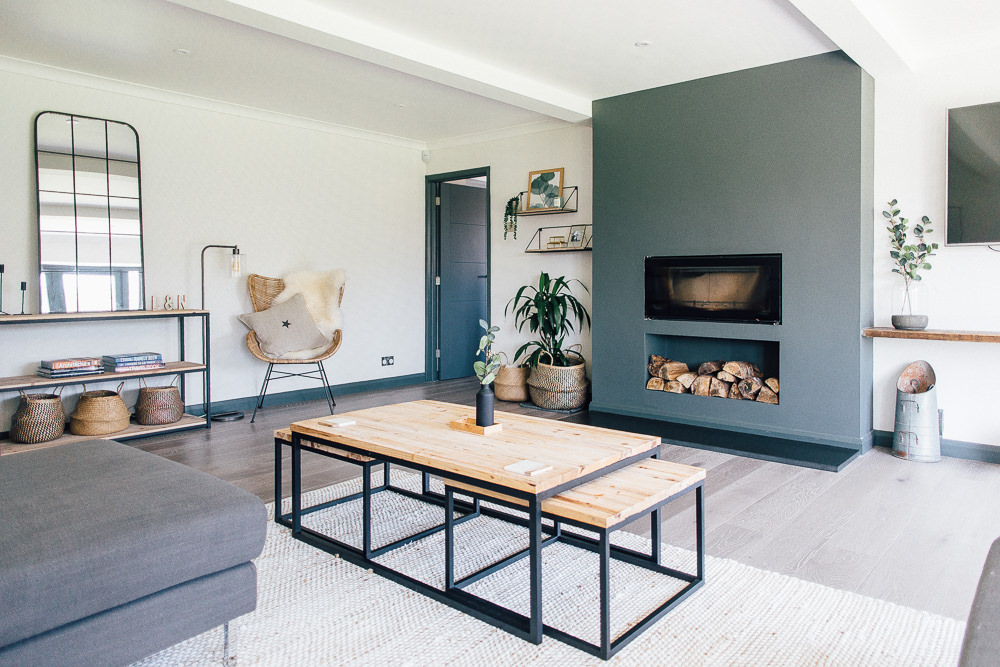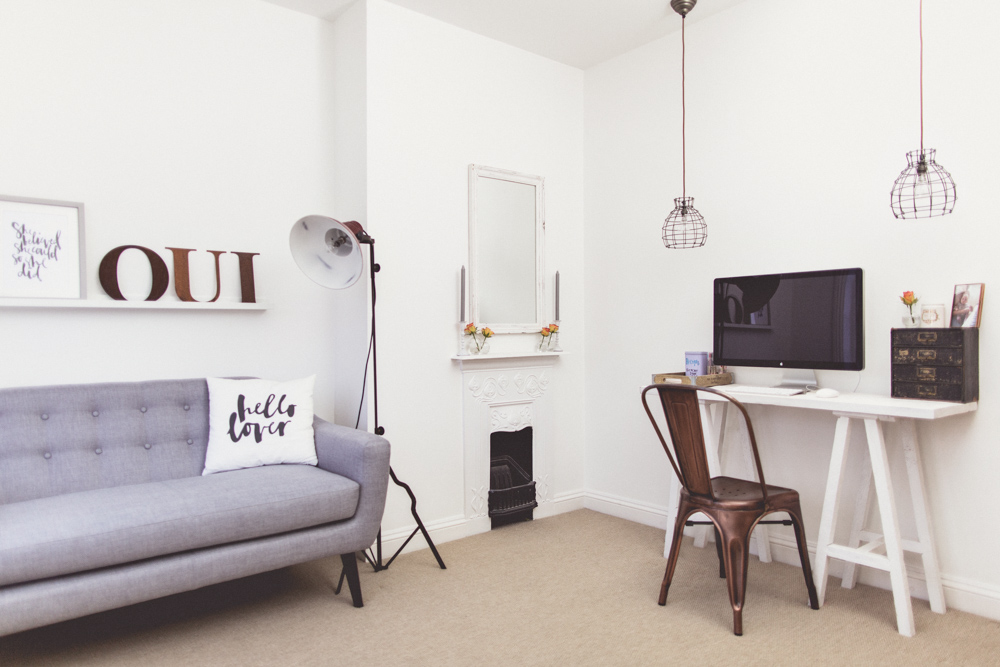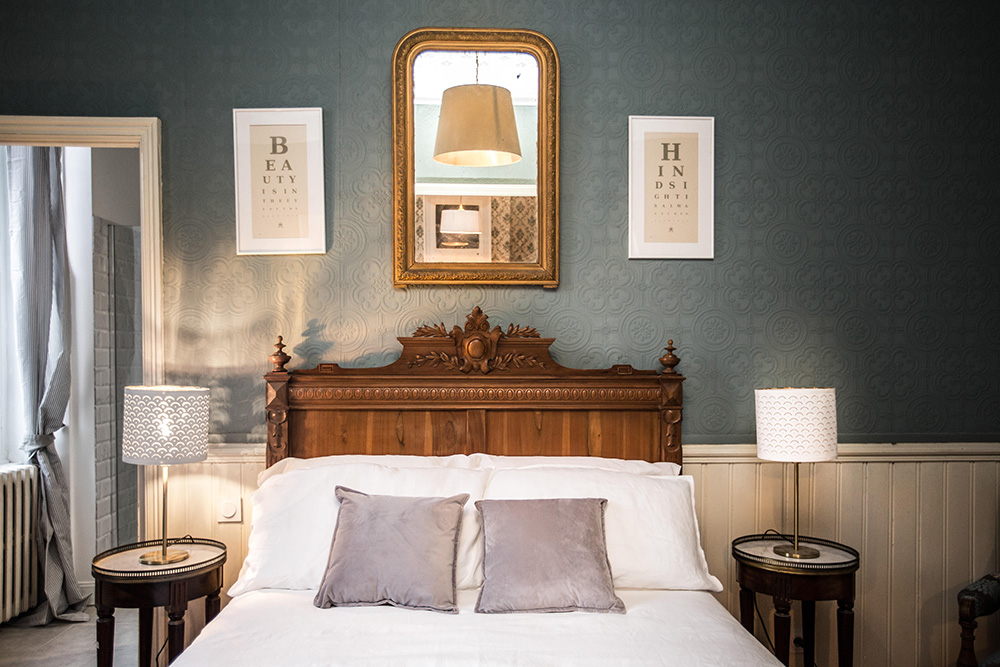I’m back today with the second post from our new career series. If you missed part one then do take a look at our negotiating a pay rise feature.
I was sat on the tube several weeks ago and my eye was drawn to an article in The Evening Standard which proclaimed ’there’s no such thing as a weekend anymore’. The journalist documented how work filled their days, evenings and weekends with no differentiation between work and leisure.
Closer to home I’d say I’ve worked hard to keep my weekends free for play. Evenings are another story but I imagine that’s the case for most of us. Also as it’s a frequent occurrence amongst my friends and family to bring home work, I don’t see working after-hours as unusual. I try my very best not to work from my bed but I have been guilty of switching on my iPad under the covers.
In the past my previous company requested all employees opted out of the European Work Directive to work a 48 hour plus week. It was just expected you’d be at your desk far longer than your contract suggested.
What are we doing in all those extra hours? Well I expect most of us are actually battling to get the job done. From my own experience I am far more productive when the office is quiet. As meetings aren’t really scheduled after five pm (in my office anyway) it’s easier to get hold of people, particularly senior management. However I’ve also seen colleagues appear to fight it out as to who can stay the longest in the office because overtime was seen as a badge of honour. I’m not sure whether they were actually doing any real work. On another note, let’s not forget some of us also love our jobs and the hours can just disappear. Time really flies when you’re having fun!
I had originally planned to centre this feature around tips for getting a work-life balance. However after an online discussion with my Facebook friends I decided to veer off course slightly to get a better understanding of your own situations.
In the name of research I posed a question to my fellow females; how many hours do you work and how many do you actually get paid for? With bated breath I waited for a response.
Turns out a huge proportion of my friends are teachers and by golly they had a lot to say on the subject. Interestingly there was also a heap of feedback from my part-time yummy mummy friends too. Overwhelmingly those who had managed to secure flexible working within a corporate company were finding they pretty much worked their contracted hours, however those who had pursued more of a creative path found they were not being financially rewarded for the time they put in. Back to the teachers, most of them were working a 65 hour week, nearly double their contracted hours.
Very few people I know seem to work a nine-to-five. Even if they leave the workplace after an eight-hour day, technology has made it far too easy for us to carry on working. Is unpaid overtime the norm for you too? I ask you all the same question; how many hours are you compensated for and how many hours do you end up working for free? Do you get paid for your extra hours or maybe time in lieu? To those who have little ones, how have your working patterns and attitude to work changed since you started a family and how flexible have you had to become?












I’m contracted to work 37 hours a week, and I’m fairly good at sticking to them, as I probably dont work more than 40. This is probably more due to the amount of travelling I have to do, its about 4 hours of travelling a day to and from work, more if I’m visiting suppliers or other offices so I don’t have the opportunity to work more hours. The most I might do is answer a few emails on the way to and from work.
I am very lucky in the respect that my line manager is fairly flexible with my hours, hes allowed me to work early and finish early twice a week so I can go to the gym at a decent time in the evening, and I have a Onesie Day (work from home day) once a week. I’ve also been allowed to have a reasonable amout of time off for fertility treatment so I don’t need to worry about making time up or having to take sick leave.
I’ve never heard of WFH once a week being called a ‘onesie day’. I like it!
Best of luck with the fertility treatment Gracie x
I have a “9-5” corporate job. On a good day I start at 8:30 and finish around 6, but often it creeps towards 7. I rarely take more than 30mins for lunch. This means about 2.5 hours of overtime a day.
My company does pay overtime but only up to a certain seniority level so I don’t qualify.
I would say these hours are common among my friends and look positively part time compared to my legal eagle buddies.
I do feel that the overtime allows me to do my job to the standard I want. I deal with a lot of external clients who have deadlines so sometimes, the work just needs to be done! Also, I am ambitious! (and proud to be). I want to be promoted and take on more work and the overtime is a great visible way of showing this to senior management.
The only worry I have is that my husband and I are thinking about babies as this level of overtime and a little one are not compatible. Any tips/experiences would be appreciated?!
I used to work with someone who twice a week would leave on the dot at 5.30pm regardless of workload. She would work unpaid overtime on three days of the week but not the other two. I think setting up this working pattern really helped when she did become a Mum.
I quite like that idea, I have the same concern when I go back to work as my job’s just not 9-5 and I don’t know how I’ll manage when I have a baby at home (7 days overdue, come on baby!)
That’s a great idea to start laying groundwork early. I’ve been meaning to go to an early evening yoga class so this might fit perfectly! Thanks
Morning! Happy Friday! I only really work my contracted hours and always ensure that I have a lunch break. There is pressure to work longer hours but I’ve done that in the past and when I started this job I made a point of leaving on time from day one. I enjoy my job and I do want to go far and I ensure that I am always working efficiently. But for me personally it is important to me to leave on time and switch off.
Happy Friday to you too Kate!
It’s so hard to go back once colleagues get used to you working certain hours. Great to set a precedent from the very beginning.
I am contracted to 37..5 hours a week however it’s rare that that’s the case. I do 12 hour days or nights and that can be in the same week most of the time weekends included and bank hols and I worked xmas day last year. I work as a nurse on intensive care so you can’t always just leave when it’s time to go it depends on what’s happening. You do get three or four days off mind you in a 7 day period depending on your shift pattern and can request certain days off. A lot of the time you can do 48-50+ hrs in a 7 day period too if that’s how your shifts fall, but I wouldn’t swap my job. You get an hour break depending on how busy it is, and you can do extra shifts and get paid if you’re also on an agency and this could be in any hospital you like. Not sure after 7 years of shifts if I could cope with 9-5 but it’s always in the back of my mind I don’t want to do nights forever! X
I admire anyone who can do a nightshift Alex!
Hats off to you for the amazing job you all do x
I only stay late if I’ve got deadlines and I absolutely have to get something finished, although I often find myself being more productive if I stay late because I focus better without the distractions of lots of phone calls and people to chat to! However I’m on maternity at the moment and when I go back to work (part time) I doubt I will ever stay late because I’ll be desperate to get home to my little girl. I imagine I’ll manage it by being a lot more efficient during the day to make sure I get done! Having said that my work doesn’t often have lots of deadlines / pressure, and it’s flexi time so any ‘overtime’ I do always counts as my hours, so it’s easy for me to say. I know some people have an awful lot more pressure in their jobs. I enjoy my job but definitely work to live rather than live to work. Will anyone really look back when they’re 80 and think ‘I wish I’d spent more time in the office’?! x
Sarah you are totes on my wave length! I will also only stay late if it’s required, but my company is great and is big into flexible working allowing me a day at home. I’m also on Mat leave and will return part time and will also make sure I absolutely leave on time. I will have plenty of deadlines and pressure however I am determined to be more efficient as I’m unwilling to give up more time with my husband and baby. I also work to live and I will never look back and wish I worked more, I can only hope I look back and think damn I’m so glad I left on time and had that evening out/played in the park/helped with homework! X
Hi Helena and Sarah,
Miranda and I were chatted about this the other day and mentioned how we often see those returning from maternity leave have so much more focus and are much efficient.
Great point about looking back! x
I’m another 9-5 (actually it’s 9:30 – 5:30 in the legal sector – I love that extra half hour in the morning!) but I very rarely leave work ‘on time’. We don’t get paid ‘overtime’ but there isn’t really a concept of overtime in any of the jobs I’ve been in…it’s just the job. You stay until you get it done (or – more realistically – until you’ve put out any burning fires and done enough to hopefully stay on top until next week…then it starts all over again!). Most days I leave between 6:30 – 7:30, I probably should stay later than that if I wanted to really get on top of everything but I just don’t want to do that so I don’t!
Oooh a half nine start. I’ve always been a half eighter. It killed me in the beginning!
I once turned down a job because it was a 9am start. I told them it was for Other Reasons but it was really because I’m so lazy and can’t get out of bed in the morning!
I remember signing the contract for my first graduate job, with the ominous line “Your contracted hours are 9 – 5:30, but you may be required to work more than that”. 4 years later I found myself needing to ask to leave the office at 05:30am, having been there since 08:00am the previous day because I need to go and catch a flight to go on holiday. I spent the first day of a long weekend away completely out of it and wondered what on earth I was doing with my twenties. A year later, I got very ill due to the impact of the hours and made the decision to never put myself – or my loved ones – through that again. I made the switch to a smaller company in a more interesting industry. I still work long hours, but only when absolutely needed. If I am finished at 5, I will leave. If I am chasing a deadline like last week, I stayed to midnight because it needed to get done. I had to work the weekend a few weeks ago because I was abroad, but I’m taking Monday off in lieu because I feel shattered at the moment. The important thing is I work when I need to, because I aspire to progress in my job and I genuinely love what I do (midnight finishes aside…) I don’t do ‘face time’ any more – it is my pet peeve! I wish I could give my early twenties self a shake and ask ‘Do I need to be here right now? Or am I just here because everyone else is?’
My career means a lot to me, but so does my health, and so does spending time with my boyfriend, friends and family. It is such a tricky one to balance, and this is even before children come into the equation. I have so much respect for mothers who work and raise children – because the juggling must be so hard – and for for mothers whose full time job is caring for their children – because their is a sacrifice to make to do that and it’s a 24/7 job. I don’t know which one I will be yet, but I do think being a women in the workplace is so tricky! Slightly veered off topic and rambled on for quite a while…sorry!
Don’t ever apologise for rambling Sian. Sometimes there’s a lot to say!
Hope you get some rest over your long weekend.
I’m a nurse and work a 12.5 hour day or night shift starting at 730 and finishing at 800. I’ve worked many shifts recently where I’ve worked solidly for the whole 12.5 hour shift and given up my hour break in order to get my paperwork done so I can leave on time. Saying that I’m usually at least 10-20 minutes late leaving at the end of a shift as the handover has over run. I won’t get this time back.
Hi Amanda, lunch hour is something I should have mentioned in the post. I know we’re always told to get away from the desk for a break but sometimes it’s just not possible is it?
I am contracted to 35 hours a week but over the last few years I had been working 50 hours per week. Last year I became quite ill to the point that I collapsed and lost all sensation in my legs three times. After numerous hospital appointments I was told it was actually most likely down to stress! So the boss and my husband put a strict ban on me working late. But as I appeared to be better the previous expectations were then put back on me and I was back into the usual working pattern. This year I have put my foot down and try not to stay later than 5:30pm, but I still haven’t recovered fully and feel fatigued most of the time which affects my personal life. I have learnt the hard way that trying to stand out at work isn’t worth sacrificing your health and that employers are not grateful for it and just seem to expect that standard once you have set it.
Hi Claire, I hope you find the balance very soon now you’re on the road to recovery x
I wish I had a 9-5 job, but as a doctor it’s just not possible. A “normal” day starts at 7 and we finish at 3.30 however there are the ‘night shifts’. Depending on the weekday they are 18-24hours long! This month I am working three out of four weekends. I love my job (I work in gyn&obs), but I don’t like the hours. It can be so exhausting. Well I’m off to my next 22h shift. Yay!
Wow 22 hours?! Hope you have a good day (and night) Anja x
Thanks, it was a good shift as they go. Two more beautiful babies on this earth!
I’m contracted 40 hours per week, it’s probably closer to 50 most weeks though – not counting the time on emails at home and on the commute (1.5hrs each way). And with a pretty impressive promotion this summer, it’s not looking like that will ease up. I do sometimes find it gets a bit much but at the same time, I have still a fair bit of freedom to decide my hours. Unless I have an important meeting, it’s doesn’t really matter if I come in later (I just end up staying longer…) and I can work from home if I need to. I also work with people all over the world so I need a certain flexibility in regards to out of hours responses – although the husband has told me off numerous times for checking work emails on a night out or on weekends.
With the exception of my friends with children who work part-time, I don’t think I really know anyone who still works Monday-Friday, 9-5. But a more flexible and supportive attitude from employers can go a long way to ensure staff are happy and healthy in spite of longer hours.
Congratulations on the promotion Maike x
Oooo this is an interesting one!
In many ways, I’m really lucky. My company has flexitime and I have a lot of personal freedom over when I work my hours. At the same time, I work in business development so my job is either feast or famine. I’m really happy to put in the extra hours during feast times but I’m darn sure I get them back when its quiet.
I push back very strongly on the long hours culture, partly because I just don’t think its productive and partly because in a lot of cases, you don’t see senior management doing the same hours. At my company, the directors are always the ones to leave on time! Which is a good thing obvs! We work some of the longest hours in Europe but that doesn’t really play out in terms of happiness or productivity so we should really be asking ourselves why we’re still doing it?
And like lots of other people have said, who gets to their dying day and wishes they’d spent more time in the office?
Great points Claire.
Flexitime is great isn’t it? It completely changed my attitude to work when I first joined a company with it. So much easier to get a work-life balance.
I find the changing attitudes to employees and working hours very frightening at the moment. On one side of the spectrum there seem to be employers who are amazingly flexible, agree to people working from home or taking “duvet days” when needed (which lets face it sometimes they are needed) but although I’ve read about lots of people online having these understanding employers I have no friends in those situations and have never met anyone who is in control of their hours. I am wondering if this is a London phenomenon? Far more common seems to be people regularly working for free, much more than they are compensated for. I have been in numerous offices now where colleagues are in competition as to who can stay the latest and pulling an all nighter is seen like a badge of honour. Why should sacrificing your personal and family life be a valid route to getting a promotion or getting noticed? I don’t think dedication to the job can only be demonstrate with long hours. I don’t think it’s ok for colleagues to bitch about their colleagues who leave when they’re supposed to, when there’s nothing outstanding left to do that day but I know of it happening and have witnessed it myself. Technology is only making it worse, I have refused to use my own phone for work purposes or get work emails on my phone. In some sectors it is appropriate but it isn’t in mine, and I pay for my phone out of my own pocket so why should that resource be given to my employer free of charge?
This is a major rant, sorry, but it’s something I feel strongly about!
We’re more than happy for you to rant here Kitty. Actually I thought it was a very well put argument. At the end of the day, you definitely shouldn’t have to sacrifice your family for a job x
I work 30 hours a week and only near year end/ audit time work longer weeks. I originally took the job as full time but after a year negotiated a 4 days week and an extra weeks holiday – so I get 6 weeks off a year. I’m pretty lucky too that when needed ( sick kids etc) I can work from home. Its no surprise that I’ll have been here 7 years in Autumn. That said its a win/win, they pay me less than if I was full time, still get the job done and my productivity and loyalty to the firm are huge.
Historically pre kids I was no stranger to 10+ hour days which is utterly mental……….
This sounds perfect Jules (not the pre kids bit though!)
Hi Lauren,
It can be very hard to take a break especially when there are urgent issues to deal with.
Gosh I envy anyone who actually does! I spent a very long time working for a global ad agency and it was not underhand of to be there till 8/9 at night most of the time and many a time I was there till 2 in the morning and back at 8 when we had pitches going on. If I had had a lot of late ones I did try to leave on time if I could but that was very rare. Lunch breaks were a quick bite at the desk. When I had my first little girl that all changed. I couldn’t stay late as I had to pick her up from nursery so I was out the door at 5. I did catch up on emails etc at night but generally just worked super fast during my working hours! My mum also kept Molly overnight one night a week which meant I was able to stay late/go in early the next day which I felt made up for the leaving early (love that 5 is classed as leaving early!). I actually found I wasn’t behind on work. I think I just powered through as I didn’t have any other choice and got a lot more done in the time. I think big companies expect a lot for little in return and I dread to think what most people’s salaries would be if you worked it out hourly nowadays!! I do think that after having kids I manage my time much better but still have the mentality of the long hours and just getting stuff done. So for everyone who has questioned above how you do it with kids, you just do, and actually you and your company are no worse off for it! xx
Great advice Lottie. x
“No-one on their death bed ever wished they’d spent more time at the office” Sorry if anyone already posted that. Its something I heard once and never forgot. I think the work culture in this country is unhealthy and I really detest that some employers won’t take you seriously if you don’t stay late or work extra hours. I applaud those who leave on time to go home and have a good balance of work and life. I have been in jobs where I worked overtime for nothing and I ended up resenting my job and hating my boss. I now work elsewhere and after having my first baby, I really would not spend an extra minute in the office when I have my baby to go home to. I realise this is not for everyone but that’s the way it is for me. I’ve got as far in my job as I ever want to go. In-fact, currently doing 4 days I would ideally like to work 3 one day so I could spend more time with my babe. Is there any reason why I shouldn’t be taken seriously in the workplace because of this? I go in and do my job and do it well giving 100% every day. I’m afraid that’s all I’m prepared to give. No more and no less.
Interesting topic!
The death bed quote is definitely one for us all to remember Sarah.
I work p/t in a construction company. Very male dominated, long hours are expected! Normal working week is 40 hrs I work 24 over 3 days 8am-4:30pm. I started after maternity leave so never worked there before children. The shock on people’s faces when I left on time when I first started was hilarious. I felt the need to justify it to anyone and everyone. I have to pick my children up at 5pm so unless pre arranged I can’t stay late.
Downside is I have to do a full time job in 3 days so I am very efficient! I also have a work mobile so I do reply to emails on my days off but to be honest this helps me. If I didn’t I’d be overwhelmed on Monday morning with hundreds of emails to go through.
I try to be very flexible and stay late if I can. A very understanding husband helps! My MD always says he is lucky he has an understanding wife as she looks after everything. I told him clearly I need to find a wife too!
Your last sentence made me laugh out loud Stacy.
Ha I was saying the exact same thing to a friend the other day. I am a full time student (37.5 hours) on a course with 50% work placement but at the moment am often doing 50+ hour weeks in lectures, placement and then personal study time. With 2 kids, a hubby running his own business and working 14 hours days and a house to run what I really need is a wife, or at least a clone!
I am contracted to 35 hours, with that lovely line of ‘working the hours required to complete my role’. I usually average 8-9 hour days, never take a lunch break and feel like my iPhone is glued to my hand! We do make a point on a Friday in my office, if we are all in that office to go for breakfast to get a bit of time back but its still a lot of hours. I am a relationship manager and love my job, but if I leave early it means so much more to do the next day. My friend works for A company that has a clocking in system, so if they do extra hours they then have to take time off some other time (ie a whole day off when you acrue enough time) and I really like that idea. X
Forgot to mention I am also pretty lucly that I can be flexible in my job and go early or come in late, I just don’t think I take advantage of that enough! Sorry for the rambling! 🙂 x
Your friends company sounds great Emma! Sometimes it’s a battle to find the time to take the holiday though. I lost over a week’s holiday from my office job last year because I just couldn’t schedule the time to take it!
I definitely don’t work a 9-5 all the time, and often work evenings or weekends, but I work from home a fair amount and if I have to work late I always do it from home. I’m careful though – I work for an international NGO and I spend my days mired in the worst things happening in the world, so it’s important for me to know when I’m in danger of burning out and take a step back. I figure I’m no sure to anyone if I’m exhausted and emotional! Luckily I have a very flexible workplace and a really wonderful boss who is quite strict about taking time off in lieu so even though there are times of intense pressure I feel like it balances out. I do sometimes wonder about doing a 9-5 though, in something I didn’t really REALLY care about. I did a summer job as a receptionist at a very quiet office once (well the actual office was busy, it just didn’t have any visitors) and had a very happy time just reading my book and eating chocolate. Though what I do is a vocation, sometimes I wonder if I shouldn’t just find something a bit less demanding and that I can leave behind when I walk out the office door!
Wow Anna, what a job. Fab to hear you have an understanding boss as this makes such a difference.
I reckon your summer job would have bored you to tears in the long run!
I despise the culture in this country that you can’t be taken seriously if you only work your contracted hours and have the audacity to take your (unpaid) lunch break! I’ve worked with so many people who thought it was a badge of honour to come into the office on Sunday, never take a day of annual leave and miss every family dinner/sport event/nativity/pick up of your children etc. In reality, these people tended to be riddled with health problems, completely unproductive and unhappy and had children who were going off the rails.
As soon as I went on maternity leave, I knew full well I wouldn’t be welcome back because I’d always been open that I would never sacrifice family life for any job and I’ve always been able to do my job within my contracted hours, so it seemed crazy to just sit at my desk for no reason!
It worked out nicely that I was able to take a good redundancy payment for a job I wouldn’t have gone back to under any circumstance, but it did make me laugh out loud when my track record of taking my full holiday entitlement, leaving the office at 5 and taking my lunch break were actually mentioned in the initial meeting! I know I’ll never ever go back to that kind of environment, if I’m working long hours it’ll be because I’m working for myself or because I’m doing a job I genuinely love, the job necessitates it and I wouldn’t feel it was taking over my life.
Wow that was some rant! It’s something I feel very strongly about though, I have so many friends who are burnt out by the time they are 30…..there’s still a long time left to work until retirement so I hope this culture changes
Agreed! Wow Em you’re right in line with my thoughts on this but your argument was much better made than mine! It is a ridiculous culture, how dare an employer suggest that taking your holiday entitlement is a negative thing! I think a lot of employers like to think their staff love being there and forget that there aren’t enough dream jobs to go around – some of us are just there because we have bills to pay and no other reason! I’m happy to admit that if my Euromillions numbers come in tonight I would be relieved if I never had to “work” another day in my life. I’d much rather spend my time helping others, volunteering, raising guide dog puppies, travelling etc… The thought that I still have 60+ years of work absolutely mortifies me!
I’m contracted for 35 hours, 9.30-5.30. The company itself and my line manager are very flexible and if I come in early, I can leave early and obviously it works the other way. In my department most people do their contracted hours, take a lunch break and leave when they should – of course there are exceptions to the rule, but no-one is made to feel bad about it either way. However, if something happens and I need to stay late, I will. But I’m not going to do it if it’s unnecessary. I feel like if you can’t get all your allocated work done in your contracted hours, then something’s wrong (not saying that it’s down to the individual but the company should recognise that if their staff consistently stay late, there’s a problem with workloads, processing, knowledge etc etc)
I also just hate staying late – if I know tomorrow’s going to be busy, I’ll come in early so I can still leave on time (I want my evening thank you very much!)
I think the UK’s attitude to working hours is ridiculous and like others have said, no-one wishes they’d spent more time in the office!
Hi Jo, So true what you say – if you can’t get your allocated work done in your working hours then management should take notice.
I’ve always worked in retail so the concept of 9-5 Mon to Fri is completely alien to me. I’ve always had to work late nights, weekends, bank holidays. On the flip side though, I have very rarely worked more than my contracted hours. Which at the moment is 40hrs a wk. My current job is much better than previous ones in that although I have to work every single Saturday I no longer have to work Sundays, late nights or Bank Hols and I finish at 5.30. Plus my work is literally ten minutes from my house. I finally have the work/life balance I’ve been trying to find.
Yay Alex. Love you’ve got the balance right. You’re so lucky having a short commute too! It makes the world of difference.
I’m very lucky in that because of the nature of the industry I work in, we HAVE to define our working ours as otherwise you could end up ‘on call’ the whole time. My contracted hours are 9-5 but I probably do 9.30-7 more often (with no lunch break as I spend a lot of time driving so I end up in a service station grabbing a sandwich and a coffee on my way through). It’s not terrible – and very flexible – but I do have evening meetings every couple of weeks (7-9pm at least) and if there’s an emergency I’m expected to be ‘on hand’ until it’s resolved – well into the night and at weekends too.
Having said that, it’s a very high stress industry, and there was no possibility of going back to work part time after I had my daughter. If it was something I wanted to do I would need to change direction in my career, so although there is some flexibility in my movements I’m still glued to my emails 5 days a week.
Sara your job sounds so interesting, may I ask what you do??
Not at all – I’m a freehold property manager. I manage the freehold interest on blocks of flats and private estates – upholding the terms of the lease, so setting budgets for the year, collecting funds, making decisions on the works to be carried out (or not), ensuring all the relevant health and safety is applied to, answering resident queries, giving advice on how legislation affects what they can do, running and minuting resident management company AGMs… The list goes on!
It is really varied and interesting, no two days are the same, and it means I know a little bit about of lots of things to do with buildings… But on the flip side, I spend a lot of time telling people that they have to pay money that they don’t really want to (or understand why they have to), there’s a lot of decision making and liability, people only contact you when there’s a problem and you get shouted at a lot because people don’t like your answers!
Being teachers, this is a huge issue for my husband and I. So much so that we have recently taken the move to the international teaching scene purely to have a much more acceptable life proportion in our work/life balance. This move completely supports the culture comments above; in my previous school, leaving within an hour or so of school finishing resulted in rolled eyes and exclusion from certain groups but here the ‘boss’ is out the door when the day finishes encouraging the rest of us to follow suit. Not only do hubby and I get more time to spend together but we are both encouraged to be more productive in the day and prioritise what really is urgent work to get out on time and spend our evenings doing what we want to do.
Hi Fiona, great to have a teacher’s viewpoint. I can’t believe how many responded to my personal post.
Best of luck with your international venture.
I used to work on average 8-6, with no lunch and no paid overtime as a Solicitor. I’m also not a highly paid person that could justify the extra hours.
I had a baby 6 months ago and I know I will not wanting to be working over when I go back. To me, by the time I commute home at 5 and pick up baby it will be almost 6.30 and then you’ve got to think about dinner, your child’s needs and bedtime and preparing their things for the next day, not to mention quality time with them. I do not see how it is feasible other than working from home once they’ve gone to bed, but for me that should be few and far between. Life is short and you don’t want to say all your free time was spent working and not living your life.
Hi Tania, gosh 8-6 is such a long day to be contracted to in the first place.
Hope you manage to find the balance when you do return.
I am on mat leave at the moment but going back to work next week as a full time teacher. My daughter will be six and a half months old. I leave for work at 6:15 in the morning and am not back till 5pm. I will then have more planning/book marking to do as well as the ‘house wife’ jobs like making tea, pack lunches, uniforms (I also have a nine year old) I am also planning our wedding in August! So I will be extremely busy and I’m extremely anxious about how I will do it all! My partner will do the morning shift with the kids but then works until 7pm nearly every night. I’m looking forward to weekends spent as a family and the brilliant holidays you get as a teacher!
I dream of 9-5! I work in retail banking for a major supermarket, which means they want us to be available to our customers as much as possible. This means during certain times of year 8:45 to 8:15.
To keep childcare costs as low as possible I work when my husband doesn’t, mostly weekends. He works four ten hour days and I do two or three nine to ten hour days, so we both end up feeling like single parents. It’s really tough as neither of us has a decent work life balance. We managed to fit in a cheeky child free coffee date this week and we both commented how it felt like a holiday!
I’m lucky in the respect that when we close we’re done for the day unless something major has gone wrong.
My mum had her own business that she adored and would have worked 24-7 if needed. I would love to have a job that I felt that way about!
Very interesting article! Whenever I have a lovely day at the weekend surrounded by family, lovely food, music and laughter I always think “THIS is what life is about, not everything I have to go back to on Monday morning”. I think it’s quite sad how the world views work now; we are all terrified to take a sick day when we really need one and as described above, it is a badge of honour to work late. Is there any such thing as a true 9-5 anymore? I am a teacher, and I have no set working hours because if there were such a thing, I’m pretty sure there would have been some kind of revolution by now! My working day is generally 8am – 6pm and then again from 8pm – 10pm at home… and usually around 4 or 5 hours at the weekend. I’ve actually just quit my full time job because the hours and the stress were having such a negative effect on me; I never slept properly, only had time for one meal a day, was having panic attacks in the morning and felt like I never got to see my fiancé or family. I’ve given up the security of my teacher’s pension, sick pay and familiar colleagues in the staffroom just to get a little bit of my life back.
I meant to say, I’ve quit the job to do supply teaching for an agency – I haven’t just quit to do nothing!